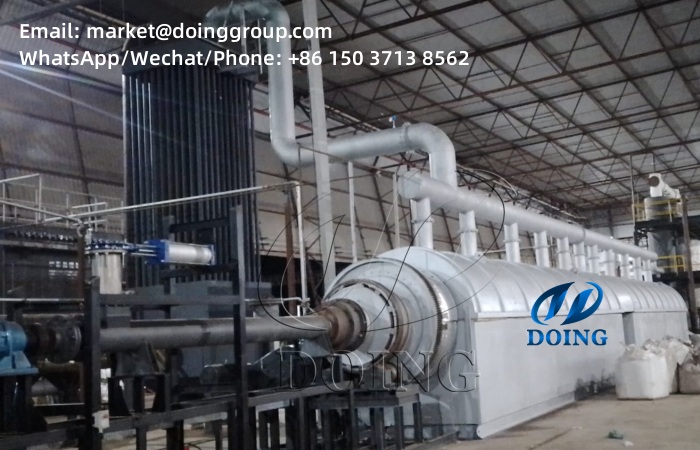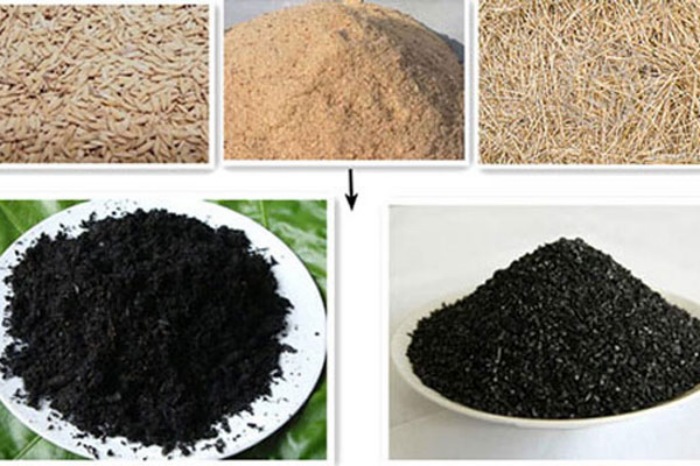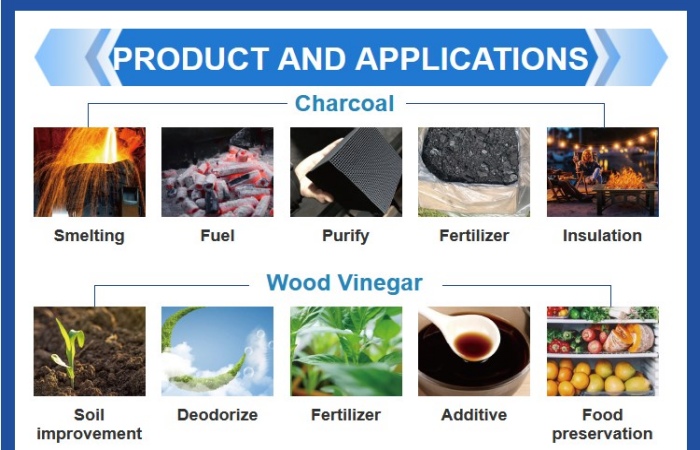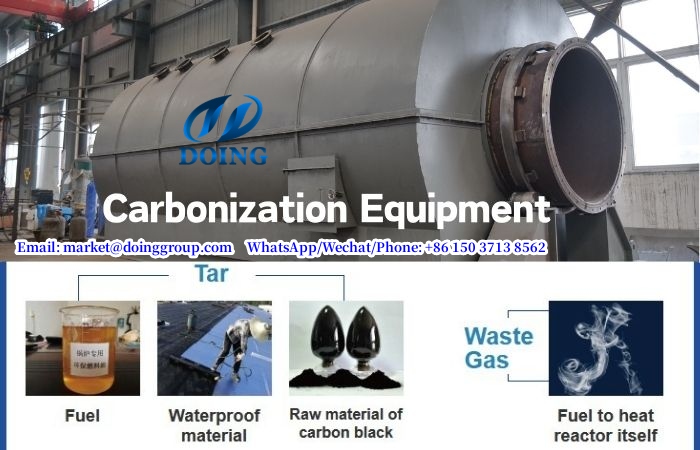 WhatsApp
WhatsApp

DOING HOLDINGS
Henan Doing Environmental Protection Technology Co., Ltd
E waste recycling machine manufacturer
- WhatsApp: +86 150 3713 8562
- Email: market@doinggroup.com
What are the products of carbonization equipment and what are they used for?
 August 15, 2024
August 15, 2024- FAQ
- Leave a message
- Chat online
Carbonization equipment plays a pivotal role in transforming organic materials into valuable carbon-based products through the process of pyrolysis, which involves heating materials in the absence or limited supply of oxygen. This technique has garnered significant attention due to its potential in waste management, energy production, and the creation of high-value industrial commodities. The main products of carbonization equipment are charcoal, wood vinegar, tar, etc. Each product has a wide range of uses and market potential.
Products of Carbonization Equipment:
Combining modern technology with environmental protection design concepts, DOING designs and manufactures efficient and environmentally friendly carbonization equipment, dedicated to converting abundant biomass resources such as agricultural waste and forestry residues into high-quality charcoal.
 Carbonization machine
Carbonization machine
DOING carbonization equipment removes moisture, volatile matter and ash from biomass waste through three main stages: drying, carbonization and cooling, and finally obtains charcoal, wood vinegar and tar. Besides, DOING carbonization equipment precisely controls the temperature and oxygen supply to slowly pyrolyze biomass materials under anaerobic conditions, maximizing the yield of charcoal while ensuring the high quality of charcoal. It is suitable for various biomass raw materials, such as straw, corn stalks, sawdust, fruit shells, etc., and shows extremely high adaptability and flexibility.
1.Charcoal : Charcoal is one of the primary products of carbonization equipment. It is produced by heating organic materials such as wood, sawdust, or agricultural waste in the absence of oxygen. The result is a highly porous, dense, and carbon-rich material with a high heat capacity and low moisture content.
 Raw materials and products
Raw materials and products
2.Wood Vinegar (Acetic Acid): Wood vinegar, also known as wood distillate, is another significant product of carbonization equipment. It is derived from the pyrolysis of wood and contains a mixture of organic acids, primarily acetic acid, along with tannins, phenols, and other compounds.
3.Tar: Tar is a thick, sticky substance that is a byproduct of the carbonization process. It is composed of a complex mixture of hydrocarbons, resins, and various organic compounds.
Carbonization equipment product application:
1.The applications of charcoal are wide-ranging:
Cooking and Heating: It is commonly used in traditional grills and ovens, providing a clean-burning fuel source.
Barbecues: Charcoal is the main ingredient in grilling, providing a smoky flavor to grilled foods.
Smelting: In the metal industry, charcoal is used as a reducing agent in the smelting of iron ore and other metals.
Water Purification: Activated carbon is used in water purification systems to remove impurities and contaminants.
Beekeeping: Charcoal is used in beehives to absorb moisture and reduce mold growth.
 The applications of charcoal and wood vinegar
The applications of charcoal and wood vinegar
2.Wood vinegar has multiple applications:
Fertilizer: Wood vinegar can be used as a natural fertilizer due to its nutritional content, which can improve soil fertility.
Pest Control: Due to its insecticidal properties, wood vinegar can be used in pest control, controlling pests without the use of synthetic chemicals.
Fungicide: Due to its antifungal properties, wood vinegar is effective in preventing plant fungal growth and is used for wood preservation.
Fabric Treatment: It can be used to treat fabrics to give them antibacterial and antistatic properties.
Wood preservative: Wood vinegar is used to protect wooden structures from decay and insects.
3.Tar has a variety of industrial uses:
 Applications of tar
Applications of tar
Paints and coatings: Tar is used in the production of paints and varnishes due to its water-repellent properties.
Road construction: It is used to produce asphalt for road construction.
Printing ink: Tar helps improve the quality and durability of printing inks.
Chemical industry: Tar can be further processed to produce a variety of chemical products, including dyes, solvents and resins.
Cement production: In some cases, tar is used as a binder in cement production.
Carbonization equipment offers a sustainable approach to converting biomass waste into valuable resources. If you want to make charcoal from biomass waste, please contact with us so that you can get more information about this business.
Contact Us
- Email:
- Tel/WhatsApp:
News

Process Workflow and Equipment for Lithium Battery Recycling

Lithium-Ion Batteries Recycling Industry: Current Status and Future Prospects Review

DOING Signs Contract with Ghana Client for 5-Ton Biochar Production Equipment

The DOING Straw Continuous Charcoal Making Machine Process Principle and Process

DOING 100-150kg/h circuit board recycling machine order in Zambia
Contact Us
If you want to get more details, you can send E-mail to market@doinggroup.com. Or you can consult our professional engineers and specialized sales team by leaving a message in below form. We will contact you ASAP.






